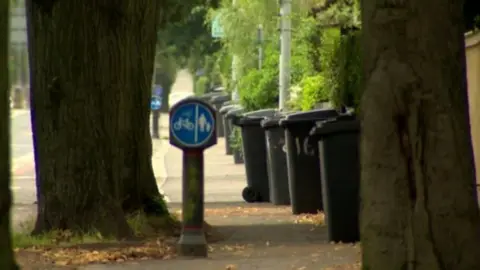Belfast City Council increases rates by 7.99%
 Pacemaker
PacemakerBelfast City Council has agreed to increase household rates by 7.99%
The rates hike was ratified at a full council meeting on Wednesday evening.
The Alliance Party failed to gain support for a proposal aimed at reducing the increase to 7.71%.
It proposed dropping the summer diversionary scheme, a programme that aims to prevent young people becoming involved in at-risk behaviour during the summer months.
However, the proposal failed to get sufficient support with concerns raised over whether there was sufficient time to assess it before the rate had to be agreed.
Councillors on the local authority's strategic policy and resources committee voted in favour of the increase in January - a decision now ratified by full council.
Alliance councillor Michael Long told BBC News NI more than half of the £500,000 from the summer diversionary scheme is "spent on concerts and DJs".
"We don't feel that in a cost-of-living crisis that was something we could justify to rate payers. We wanted to have a rate that was lower," he said.

Mr Long added: "I don't think people will be happy with the size of the rate increase, but the reality is that most of this is going to go on wages for our staff.
"If we didn't increase the rate, we wouldn't be able to afford that.
"We have extra heating costs in leisure centres. Most of the costs are costs that are uncontrollable and beyond our ability to actually deal with."
Sinn Féin councillor Ciaran Beattie told the Belfast City Council chamber that the Alliance proposal would have saved 83p a year for ratepayers compared to the higher rate and argued the rates had to pay for a council staff pay rise.
In a statement afterwards, Mr Beattie said the council was facing "significant financial pressures because of years of Tory austerity cuts, Brexit, soaring energy costs and the cost-of-living crisis".
He said his party's priorities was pay rises for council workers, protecting jobs and ensuring economic investment.
"As a result, Sinn Féin worked with other parties to minimise the burden on households by keeping the average increase down to 63p per week."
However, Councillor Fiona Ferguson, whose party People Before Profit Alliance was against the increase, said the situation was avoidable.
She said inflation and rise in prices were not the fault of the ordinary people "and so the solution for that should not be pushed on to them".
"People in working class communities can't pay it - they are in cold homes with no electricity," she told BBC News NI's Good Morning Ulster programme.

SDLP councillor Dónal Lyons said that the council was failing residents and businesses by considering a rates increase when many are struggling.
"This council, which has spent too much of its time taking on the the responsibilities of a quasi-Stormont department which it is ill-equipped to do, should instead be meeting the needs of the people in this city while delivering value for money," he said.
People Before Profit councillor Fiona Ferguson said the party refused to further punish people who are struggling with the cost-of-living crisis."
"Many thousands of people in Belfast are struggling with the price of bill, striking for basic pay offers, turning to food banks," she said.
Ms Ferguson added: "This rates hike was completely avoidable. We knew the cost of inflation was coming yet the Stormont Executive and the Tories failed to bail out councils, long before institutions collapsed."
Chair of the council's Strategic Policy and Resources Committee, Emmett McDonough-Brown, described council's ability to keep rate increases below 3% for the last seven years as a "significant achievement".
However, the Alliance councillor said that no one, including councils, was exempt from the impact of the cost-of-living crisis and the rising costs of energy and services.
"While we are unfortunately seeing an increase in rates this year, I am pleased that we have been able to keep it below the current rate of inflation; parties have worked hard to keep the rise as low as possible while continuing to invest in our services," he added.

What does the rates increase mean in real terms?
Average monthly increase will be:
- £2.05 for a terraced property
- £3.13 for a three-bed semi-detached property
- £6.97 for a four-bed detached property
- £1.98 for an apartment
- £51.44 for an office property
- £42.14 for a retail property

Domestic rates are made up of a regional rate - usually set by the Northern Ireland Assembly - and a district rate set by Northern Ireland's councils.
In the absence of a sitting assembly, the Northern Ireland Office (NIO) will set the regional rate.
It is understood that regional rate increase will be struck ahead of bills being sent out in April.
The money generated by rates is used to pay for public services, with bills decided against the value of a property.
The regional rate covers services like hospitals and roads maintenance, while the district rate covers services like leisure centre facilities and waste management.
The other 10 councils in Northern Ireland will agree their district rate for the 2022/23 financial year later in February.
Last year, there was a 2.99% increase in rates in Belfast.
